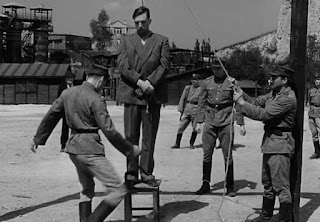The curious case of Walter Rowland.
Walter Graham Rowland had been convicted on the 16th of December 1946 of battering to death 40 year old Olive Balchin on a bomb site in Cumberland Street, Manchester on the 20th of October 1946, where her body was found by two schoolboys who reported it to the police.
As officers searched the crime scene, they discovered Olive’s wartime identity card together with a blood stained hammer of the type used in the leather trade. Olive was a prostitute and Rowland was one of her known clients. Several witnesses described seeing a man fitting his description in the area with a woman on that Sunday night.
One was Edith Copley, a waitress at the Queen's Café who remembered seeing Olive in the cafe between 10.30 and 11 p.m. on the night of the murder. Olive was in the company of a man carrying an oblong brown paper parcel.
Edward MacDonald who ran a hardware shop reported that he had sold a hammer to a man wearing a dark suit and fawn raincoat on Saturday the 20th of October and that he had wrapped it in brown paper for the customer.
The police checked local hostels and interviewed a man who had loaned a fawn cotton raincoat to a man whom he named as Rowland. Rowland was arrested on October the 26th at the Services Transit Dormitory. During his interview he admitted knowing Olive and told the police that he was being treated for venereal disease which he could have got from her. In fact he hadn't as Olive tested negative for V.D. Rowland was picked out in an identity parade by Edith Copley, Edward MacDonald and Norman Mercer who told police that he had seen Rowland and Olive quarrelling.
However Rowland had a strong alibi for that evening. He had gone to visit his mother and later went to a pub where he saw two policemen. This was corroborated as being about 10.30 p.m. by one of them, Sgt. Jones. Rowland caught the bus home and arrived around 11 p.m., as corroborated by his landlord.
So the case against Rowland was far from strong. But after a three day trial at Manchester he was convicted and sentenced to death by Mr. Justice Sellers. When the jury found him guilty Rowland said “May God forgive you. You have condemned an innocent man.”
Whilst awaiting execution the governor of Liverpool’s Walton prison received a note from one of the inmates, David Ware, who claimed that he had killed Olive. This led to a Home Office investigation by J. C. Jolly K.C. during which Ware withdrew his confession. Jolly concluded that Ware was one of those odd people who confess to crimes they have read about but could not have committed.
The three eyewitnesses, who had identified Rowland, failed to recognize Ware. The official inquiry reported that there had been no miscarriage of justice in the Rowland conviction.
Rowland’s appeal before the Lord Chief Justice and Justices Humphreys and Lewis was dismissed on the 16th of December and the 38 year old was duly hanged at Strangeways prison in Manchester by Albert Pierrepoint, assisted by Henry Critchell, at 9.00 a.m. on Thursday the 27th of February 1947. He weighed 161 lbs. and was given a drop of six feet eleven inches, resulting in the dislocation of the second cervical vertebra.
It was not Rowland’s first time in the condemned cell. He had been sentenced to death in May 1934 for strangling his two year old daughter, Mavis Agnes, to death on the 2nd of March 1934. The jury had strongly recommended him to mercy. He was reprieved and served just eight years and two months of his life sentence.
In July, 1951, four years after Rowland’s execution, Ware was living in Bristol and attempted to kill a woman who was a complete stranger to him. He lured her to an open field, where he attacked her with a hammer, he had purchased earlier that same day. The head of the hammer had broken away, no doubt saving the woman's life. A short time later, Ware walked into a police station and confessed.
His only explanation for the attack was that he “felt the urge” to kill a woman. He had bought the hammer with the intention of using it as a weapon. He was found not guilty by reason of insanity and was sent to Broadmoor, where he hanged himself on the 1st of April 1954. So was Rowland reprieved for the crime he definitely committed and hanged for a murder that he might not have committed?

.jpeg)










Comments
Post a Comment